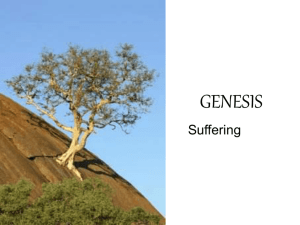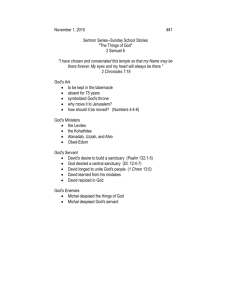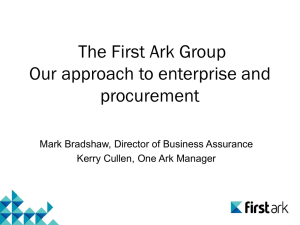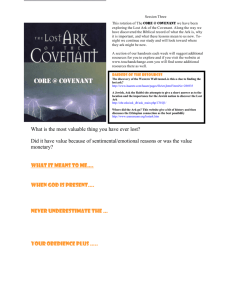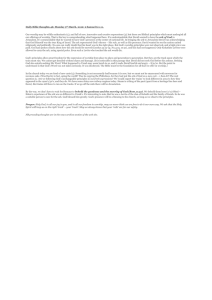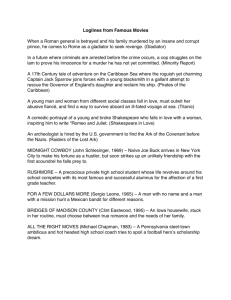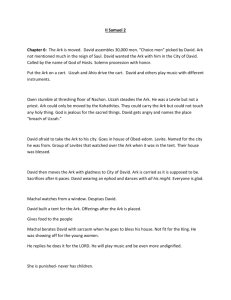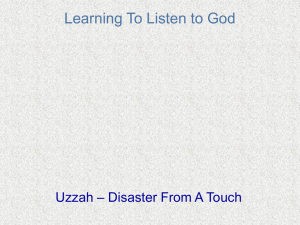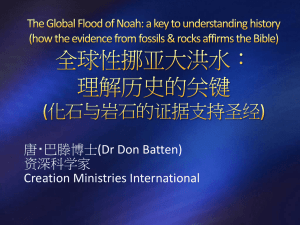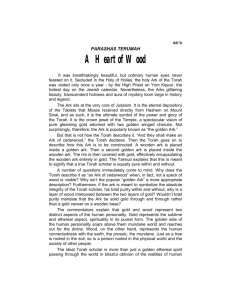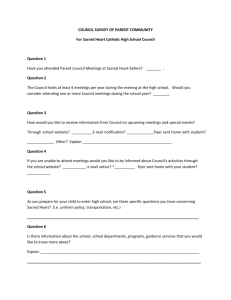Why Is there Danger In the Most Holy Things?
advertisement
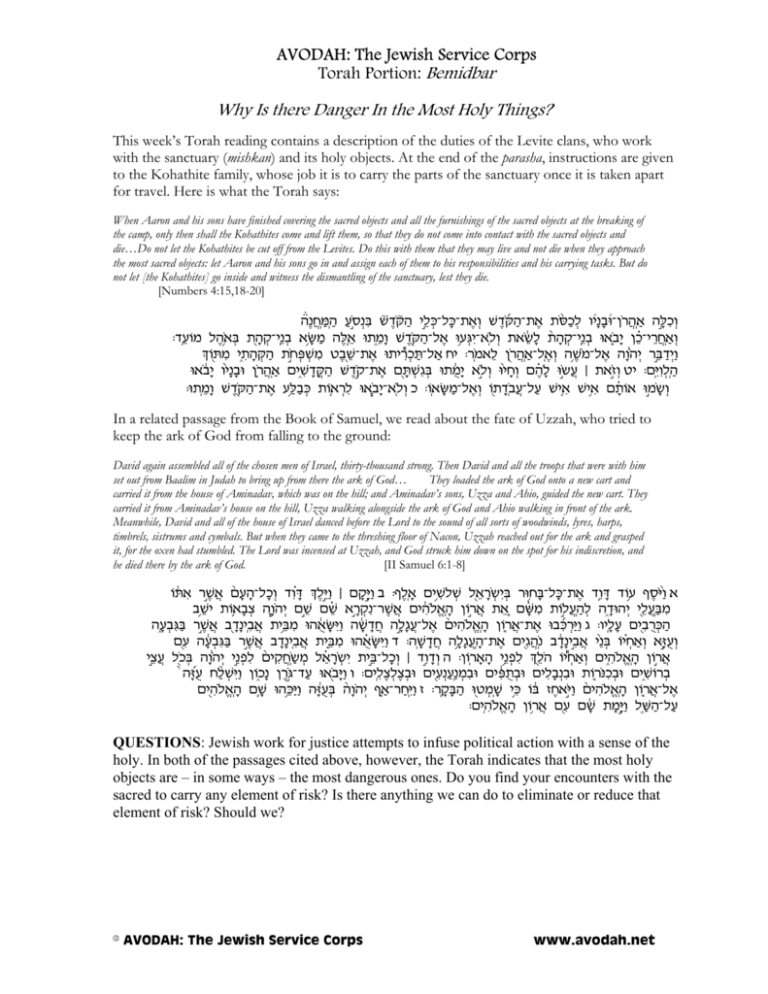
AVODAH: The Jewish Service Corps Torah Portion: Bemidbar Why Is there Danger In the Most Holy Things? This week’s Torah reading contains a description of the duties of the Levite clans, who work with the sanctuary (mishkan) and its holy objects. At the end of the parasha, instructions are given to the Kohathite family, whose job it is to carry the parts of the sanctuary once it is taken apart for travel. Here is what the Torah says: When Aaron and his sons have finished covering the sacred objects and all the furnishings of the sacred objects at the breaking of the camp, only then shall the Kohathites come and lift them, so that they do not come into contact with the sacred objects and die…Do not let the Kohathites be cut off from the Levites. Do this with them that they may live and not die when they approach the most sacred objects: let Aaron and his sons go in and assign each of them to his responsibilities and his carrying tasks. But do not let [the Kohathites] go inside and witness the dismantling of the sanctuary, lest they die. [Numbers 4:15,18-20] ¸v®b£j©N©v g«x±bC J¤s«E©v hkF kF ,¤t±u J¤s«E©v ,¤t ,«Xfk uh²bcU i«r£v©t vKf±u :sgIn k¤v«tC ,¨v§e h¯bc t¨¬©n vK¥t U,·¥n²u J¤s«E©v k¤t Ug±D°h tO±u ,tº«¥ak ,¨v§e h¯bc Ut«c²h if h¥r£j©t±u QIT¦n h·¦,¨v§E©v ,«jP§J¦n yc¥J ,¤t U,h¦rf©T k©tjh :r«ntk i«r£v©t k¤t±u v¤J«n k¤t vº²u«v±h rC©s±h³u Ut«ºc²h uh²bcU i«r£v©t oh·¦J¨s¢E©v J¤s«e ,¤t o¨T§J°dC U,ºªn²h tO±u Uh¨j±u o¤vk U«ag | ,t«z±uyh :o°H°uk©v :U,¥n²u J¤s«E©v ,¤t gKcF ,It§rk Ut«c²h tO±uf :It¨¬©n k¤t±u I,¨s«cg kg Jh¦t Jh¦t o¨,It Un«¨a±u In a related passage from the Book of Samuel, we read about the fate of Uzzah, who tried to keep the ark of God from falling to the ground: David again assembled all of the chosen men of Israel, thirty-thousand strong. Then David and all the troops that were with him set out from Baalim in Judah to bring up from there the ark of God… They loaded the ark of God onto a new cart and carried it from the house of Aminadav, which was on the hill; and Aminadav’s sons, Uzza and Ahio, guided the new cart. They carried it from Aminadav’s house on the hill, Uzza walking alongside the ark of God and Ahio walking in front of the ark. Meanwhile, David and all of the house of Israel danced before the Lord to the sound of all sorts of woodwinds, lyres, harps, timbrels, sistrums and cymbals. But when they came to the threshing floor of Nacon, Uzzah reached out for the ark and grasped it, for the oxen had stumbled. The Lord was incensed at Uzzah, and God struck him down on the spot for his indiscretion, and he died there by the ark of God. [II Samuel 6:1-8] IºT¦t r¤J£t og¨v kf±u s°u¨S Qk¯H³u | o¨e²H³uc :;k¨t oh¦Jk§J k¥t¨r«§a°hC rUjC kF ,¤t s°u¨S sIg ;¤x«H³ut c¥Jh ,Itcm v²u«v±h o¥J o¥J t¨r§e°b r¤J£t ohº¦vO¡t¨v iIr£t ,¥t o¨ ¦n ,Ikg©vk v·¨sUv±h hkgC¦n v·gc°DC r¤J£t c¨s²bhc£t ,hC¦n Uvºªt¨¬°H³u vº¨J¨s£j vk²dg k¤t oh¦vO¡t¨v iIrt £ ,¤t UcF§r³H³ud :uhkg ohcªrF©v og vºgc°DC r¤J£t c¨s²bhc£t ,hC¦n Uvªt¨¬°H³us :v¨J¨s£j vk²dg¨v ,¤t oh°d£v«b cº¨s²bhc£t h¯bC Ih§j©t±u t²Zg±u hmg k«fC vº²u«v±h h¯bpk oh¦e£j«©a§n k¥t¨r«§a°h ,hC kf±u | s°u¨s±uv :iIr¨t¨v h¯bpk Qk«v Ih§j©t±u oh·¦vO¡t¨v iIr£t v²Zg jk§J°H³u iI·f²b i¤r«D sg Ut«c²H³uu :ohkmkmcU ohg±bg³b§ncU ohºPª,cU ohkc±bcU ,Ir«BfcU oh·¦JIrc oh¦vO¡t¨v o¨J UvF³H³u vº²ZgC v²u«v±h ;©t r©j°H³uz :r¨eC©v Uy§n¨J hF IºC z¤jt«H³u oh¦vO¡t¨v iIr£t k¤t :oh¦vO¡t¨v iIr£t og oº¨J ,¨n²H³u k·© ©v kg QUESTIONS: Jewish work for justice attempts to infuse political action with a sense of the holy. In both of the passages cited above, however, the Torah indicates that the most holy objects are – in some ways – the most dangerous ones. Do you find your encounters with the sacred to carry any element of risk? Is there anything we can do to eliminate or reduce that element of risk? Should we? © AVODAH: The Jewish Service Corps www.avodah.net
